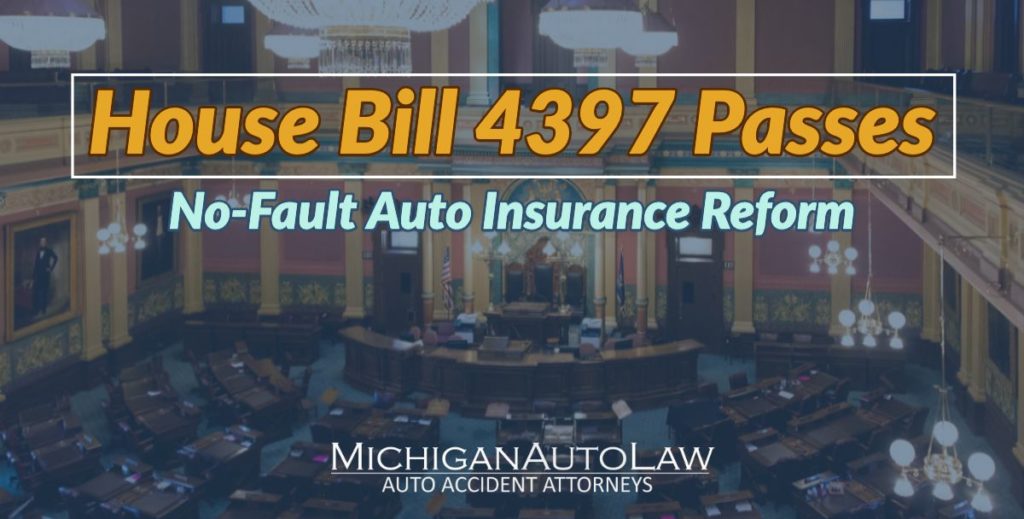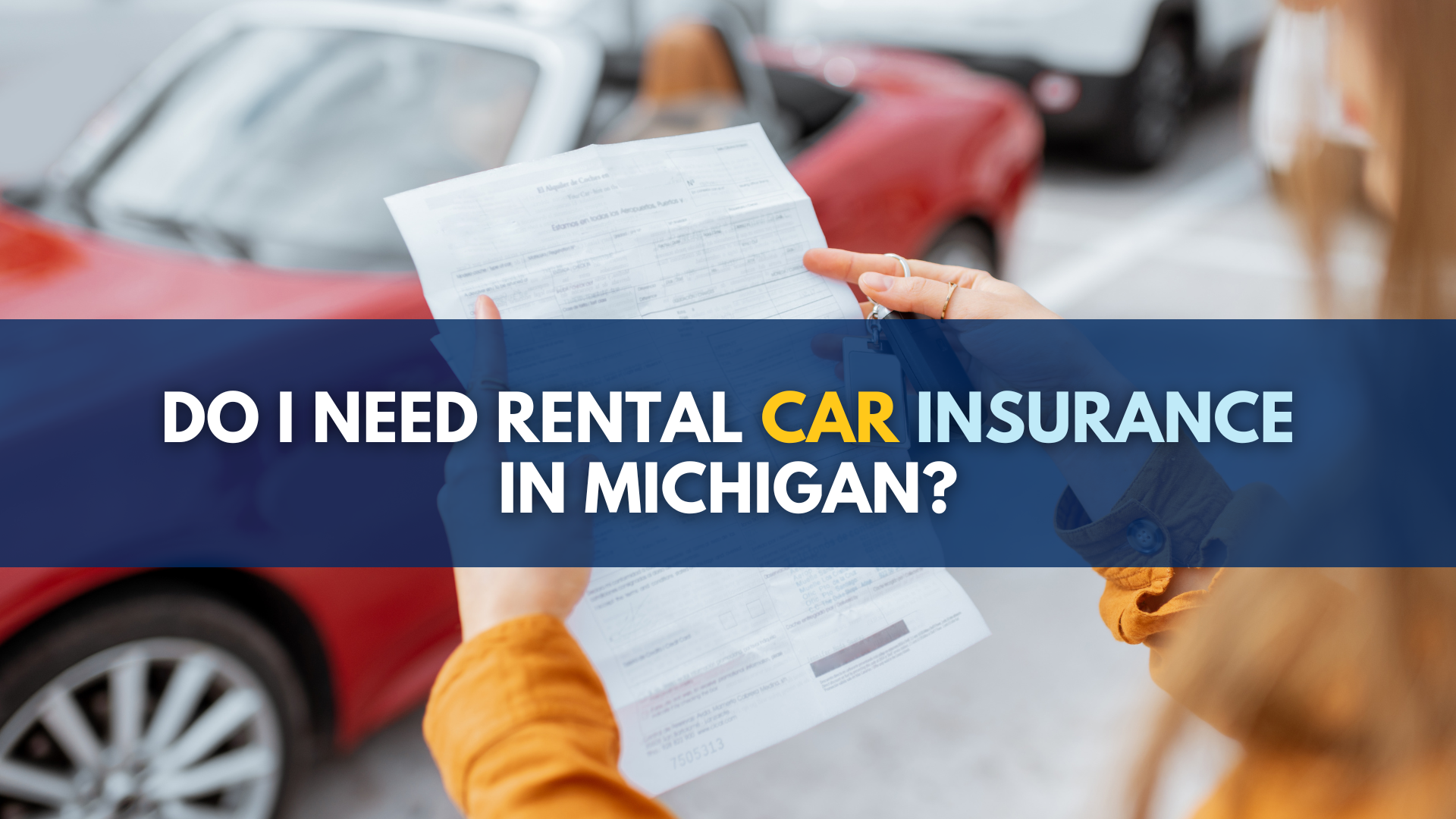
A little after 2am today, May 9th, the Michigan House of Representatives passed their own version of No-Fault auto insurance reform on a 61 to 49 vote.
With this vote, lawmakers in the House have approved a sweeping No-Fault auto insurance overhaul plan that replaces the plan House Bill 4397 initially proposed in March when the legislation was introduced.
The House-passed version of HB 4397 is notable for two very significant reasons:
- First, gone is the original intention of the bills’ sponsors to junk Michigan’s 45-year-old No-Fault auto insurance system and turn Michigan into a pure tort liability system in its place.
- Second, the House-passed version of HB 4397 largely tracks and mirrors the No-Fault reform plan passed by the Senate on Tuesday in Senate Bill 1.
To review the main points of Senate Bill 1 – which also appear in HB 4397 – please check out our blog post, “New Michigan No-Fault Auto Insurance Bill: What Does It Mean?”
Below I discuss in detail the ways in which the House-passed version of House Bill 4397 differs from Senate Bill 1 (the page numbers cite to the 86-page PDF of HB 4397).
IMPORTANT: The legislation discussed in this blog post is still pending in the Michigan Legislature. The law has not changed, nor will it change unless and until this legislation has been passed by both the Michigan House of Representatives and the Michigan Senate and signed by the governor. There is no need at this time to update or otherwise make changes to your current Michigan No-Fault auto insurance policy.
No more calls to eliminate No-Fault and replace with a pure tort system
When House Bill 4397 was initially introduced in March, its sponsors were calling for Michigan to adopt a pure tort system because No-Fault was so bad and so beyond repair. One sponsor said: “Michigan should consider repealing its no-fault system and replacing it with a system that drivers can afford and 38 other states use.” Other sponsors called No-Fault a “rigged system” and “broken.” They seemed confident in their beliefs then. Why should we be confident in their change of beliefs now?
No-Fault PIP benefit cap of $500,000
The House-passed version of HB 4397 adds a $500,000 level to the No-Fault PIP benefit caps provided in Senate Bill 1. (Page 43)
Savings of 80% to 10% on No-Fault portion of drivers’ auto insurance bills
The House-passed version provides guaranteed savings, i.e., premium rate reductions, in the following amounts: 80% or more for drivers who opt for the $50,000 No-Fault PIP cap; 60% or more for drivers who select the $250,000 No-Fault PIP cap; 30% or more for drivers who choose a $500,000 No-Fault PIP cap; and 10% or more for drivers who want “no limit” on their No-Fault PIP benefits. (Page 10)
Savings for drivers who opt-out of No-Fault medical benefits
The House-passed version provides that drivers who select to forgo No-Fault medical benefits (i.e., No-Fault “allowable expenses” under MCL 500.3107(1)(a) which pay for a car crash victim’s accident-related medical expenses) will incur “no premium charge for [the] coverage” they opted out of. In other words, drivers won’t have to pay for coverage they don’t want. Significantly, both Senate Bill 1 and the House-passed version of HB 4397 appear to allow these drivers – in the event they are injured in a car crash – to sue the at-fault drivers “without limit” for their accident-related medical expenses. (Pages 44 and 57)
No more gender or marital status discrimination in setting auto insurance prices and no use of rating factors other than what is permitted by 500.2111 of the Insurance Code
The House-passed version of House Bill 4397 closes the legal loophole that allowed group insurance to discriminate against women and widows by charging them more for car insurance. The bill prohibits all insurers – group and otherwise – from basing auto insurance rates “on a factor that is not allowed, or that is prohibited, under section 2111.” (Page 6)
No use of non-driving factors in setting auto insurance premiums
Currently, the Insurance Code prohibits insurers from basing auto insurance premiums on an insured’s “sex” or “marital status” – even though some insurers, as I have blogged about many times, brazenly violate this law. (MCL 500.2111(4)) The House-passed version of HB 4397 expands on this prohibition by forbidding the use of any “non-driving factor” in setting car insurance prices. (Page 9) A non-driving factor is defined as “any factor for which there is no rational correlation between the factor and insurance losses.” (Page 10) The Insurance Commissioner will “establish the factors that are non-driving factors.” (Page 10)
No ‘redlining,’ but insurers can still use ‘territories’ to set rates
As with Senate Bill 1, the House-passed version of HB 4397 prohibits what it calls “redlining,” which is where insurers refuse to insure or limit the amount of coverage “because of the location of the risk.” (Page 8) However, the existing law which provides that “automobile insurance risks may be grouped by territory” remains intact and is unchanged by the House-passed bill. (See MCL 500.2111(5)) Nor does the House-passed bill change the existing rule that allows insurers and rating organizations to establish and maintain “statistical reporting territories.” (MCL 500.2111(6))
Use of credit scores appears to be expanded
The House-passed version of HB 4397 does not change the existing law which permits insurers to use a person’s credit information and/or a credit-based insurance score to set rates. However, it does appear to allow insurers to deny, cancel or nonrenew an auto insurance policy based on a person’s credit. (Page 15-16) The existing law provides: “An insurer shall not use credit information or an insurance score as any part of a decision to deny, cancel, or nonrenew a personal insurance policy under chapters 21, 24, and 26.” (MCL 500.2153) The House’s bill would remove “automobile insurance” from the meaning of “personal insurance,” which would thereby allow auto insurers to deny, cancel or nonrenew based on a person’s credit score.
Tolling of the one-year back rule
Under existing No-Fault law, when a car accident victim has been denied or cut-off from No-Fault benefits and sues to recover the unpaid and overdue benefits, he or she “may not recover benefits for any portion of the loss incurred more than 1 year before the date on which the action was commenced.” (MCL 500.3145(1)) The House-passed version of HB 4397 provides that this “limitation . . . is tolled from the date the person claiming the benefits makes a specific claim for the benefits until the date the insurer formally denies the claim.” However, the bill cautions that tolling “does not apply if the person claiming the benefits fails to pursue the claim with reasonable diligence.” (Page 59)


